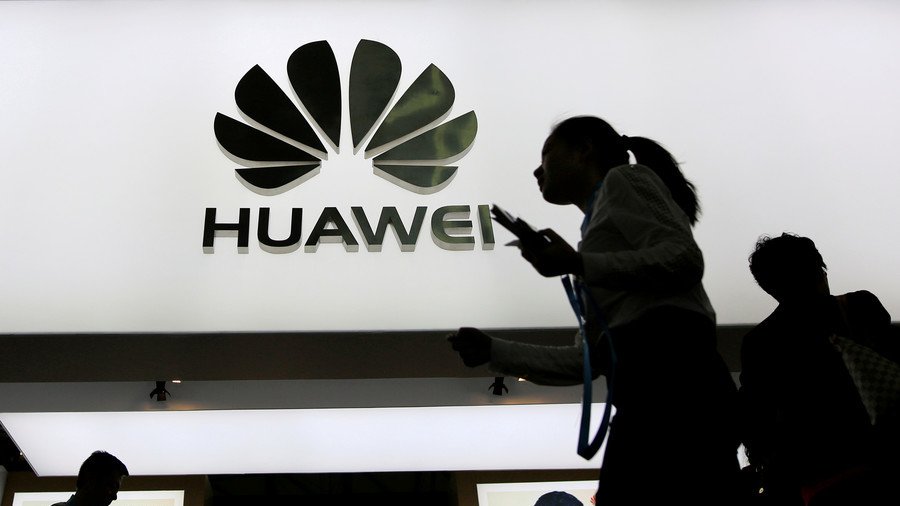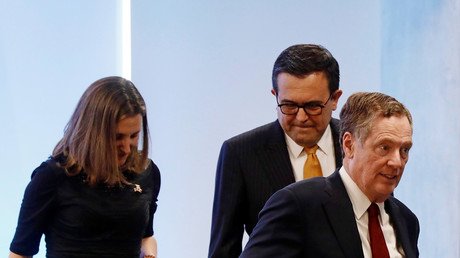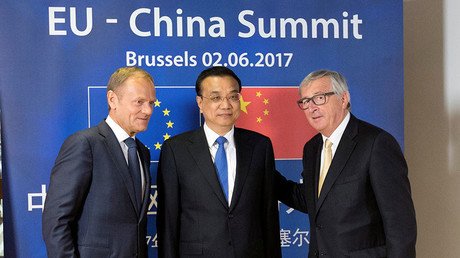Trump eyeing punitive tariffs on $60bn of Chinese imports, tech – report

The Trump administration is looking to impose additional tariffs on Chinese goods and plans to target Beijing’s telecommunications and technology sectors, reports say.
US President Donald Trump is eying imposing tariffs on $60 billion of Chinese imports, Reuters reports via a White House source. Washington contemplated the tariffs after accusing Chinese technology companies of intellectual property theft, alleging that US companies have been forced to give up their technological secrets in order to continue operating in China.
This comes after Politico reported that Trump had turned down an initial $30 billion proposal that was drawn up last week by US Trade Representative (USTR) Robert Lighthizer.
Lighthizer ordered an investigation in August 2017, which claims to follow up with a USTR memorandum signed by Trump on August 14, 2017. The president aimed to set a policy that would improve America’s economic growth, “contribute favorably to our balance of trade,” and “strengthen the American manufacturing base,” and more.
“Violations of intellectual property rights and other unfair technology transfers potentially threaten United States firms by undermining their ability to compete fairly in the global market,” the executive order said.
Lighthizer cites Section 301 of the Trade Act of 1974, which authorizes US authorities to create a “retaliation list” of goods to sanction in the event the US feels threatened economically.
Trump’s protectionist tactics were a part of his campaign promises to American voters, however, his actions have exacerbated tensions between Beijing and Washington.
As of December 2017, the US has run a massive $375 billion trade deficit with Beijing, but in order to cull America’s underperforming exports, Trump has persistently demanded that Chinese leadership draft a comprehensive proposal to reduce the deficit.
“China has been asked to develop a plan for the year of a One Billion Dollar reduction in their massive Trade Deficit with the United States,” Trump tweeted on March 7. “Our relationship with China has been a very good one, and we look forward to seeing what ideas they come back with. We must act soon!”
China has been asked to develop a plan for the year of a One Billion Dollar reduction in their massive Trade Deficit with the United States. Our relationship with China has been a very good one, and we look forward to seeing what ideas they come back with. We must act soon!
— Donald J. Trump (@realDonaldTrump) March 7, 2018
However, Trump has pushed forward with his agenda by slapping Chinese industries with harsh tariffs on steel and aluminum imports to the US and insisting on giving preferential treatment to global allies based on favorable military and economic alliances.
He has also withdrawn from the Trans-Pacific Partnership (TPP), a trade agreement that was negotiated by former President Barack Obama’s administration and one of its most ambitious efforts. The 11 country-strong Comprehensive and Progressive Agreement for Trans-Pacific Partnership (CPTPP) has since taken its place and 22 of the TPP’s original provisions were suspended. China remains excluded from the agreement, but many speculate that the US’s absence may impel Beijing to step in.
Trump has also demanded that Mexico and Canada renegotiate the North American Free Trade Agreement (NAFTA) in order to qualify for exemptions from his global tariff regime.
On March 8, Chinese Foreign Minister Wang Yi vowed there would be a “justified and necessary response” to Washington’s tariffs on steel and aluminum imports. China currently makes up a small percentage of America’s steel imports.
“China urges the US to respect the authority of the multilateral trade system, and repeal the measures as soon as possible,” a China Ministry of Commerce statement recommended.















